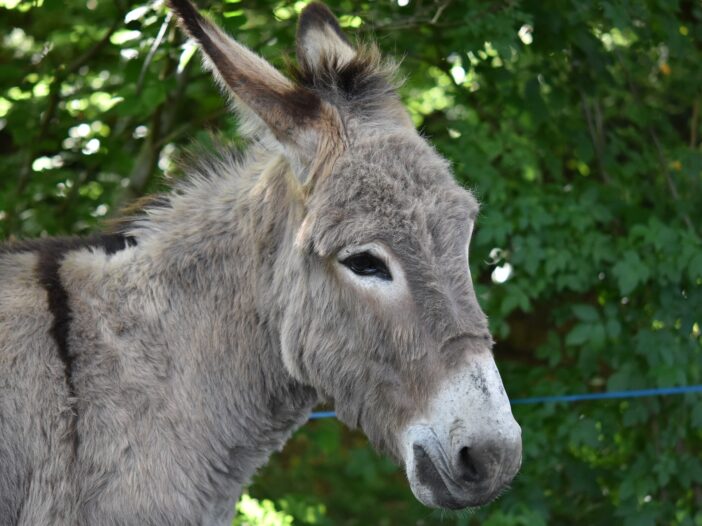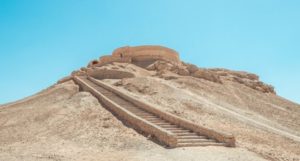
Do you have Sunday school memories of Balaam’s talking donkey? From that charming perspective, Balaam seems to be the ass, while the donkey wisely recognizes God’s angel standing in the road. But the full story is more interesting—and totally relevant to today’s current events.
Knowing about God vs Knowing God
Balak, the king of Moab, hears the fledgling Israelite nation has wiped out the Amorites. So he summons Balaam, a Midianite seer for hire, to curse the Israelites before they get any closer to Balak’s kingdom.
Balaam has a double pedigree as a high-profile soothsayer and brother of a king of Edom (southwest of Moab). Balaam’s words must be spot on—because if he predicts something that doesn’t come true, he won’t live long enough to ply his craft again.
Balak is willing to pay lavishly for Balaam’s services.
Ironically, Balaam claims to know Yahweh. And, surprise—God talks directly to him! God says don’t curse the Israelites and don’t go with Balak’s people. When Balaam obeys God, Balak plies Balaam with more dignitaries and gifts. Again Balaam refuses, but this time he invites the emissaries to stay the night, suggesting they wait around to see what else God has to say to him.
That was a treacherous bend in Balaam’s road.
Don’t round that bend
Balaam wasn’t practicing hospitality; he was flirting with temptation and pride. He was pleased that he was continuing to hear and relay what God was telling him, but God could see into Balaam’s heart. That was revealed in the scene when Balaam mistreated his donkey and God enabled the donkey to speak to him.
When God is right in front of me and I can see Him working, why should I ever doubt or deny Him?
Balaam’s encounter with the angel of God seems to change his heart. He confesses to God that he has sinned (Numbers 22:34).
After that, no matter what Balak does, Balaam simply delivers another oracle of blessing upon Israel and prophecy of destruction for Israel’s enemies. The fourth oracle includes a famous Messianic prophecy (Numbers 24:17).
But that’s not the end of the story.
Balak leaves. Balaam isn’t paid. What will happen to Balaam’s reputation now? Has he lost all future income by being Yahweh’s mouthpiece?
Balaam makes a dreadful choice.
If I can’t curse them, I’ll corrupt them.
Balaam’s Plan B is the enemy’s Plan A
Balaam’s plan has been the enemy’s MO since the first Messianic prophecy in Genesis 3:15. Satan knows our spiritual, eternal future with God is secure when we accept Christ as our Savior. The curse of sin no longer holds us in its death grip. But the enemy can still corrupt us—and he devotes all his energy to it.
What Balaam does next is reprehensible (with plenty of blame to dish to everyone). He influences the Moabites and Midianites to woo the Israelites into participating in pagan practices—elaborate meals ending with ritual sexual relations as acts of worship. Perhaps Balaam also knows that the Israelite tribes of Reuben, Gad and part of Manasseh are already settled near Moab. Maybe Balaam recruits them, too, hoping they’ve assimilated enough of Moab’s culture to lure the other Israelite tribes into corruption. The Israelites’ just, jealous God would deal with the fallout.
History tells us that acting like “one of them” never ends well. For example, King Solomon married a Moabite princess—and, just east of Jerusalem, he built an altar to the Moabite’s main god, Chemosh. Was God angry? You bet.
Balaam’s story in Numbers 22–25 makes me think of today’s crises. Russia’s gross governmental overreach in invading the Ukraine. The United States’ gross overreach of governmental authority with the COVID crisis. Today’s world’s stage smacks of Proverbs 29:12: “If a ruler listens to lies, all his officials become wicked.”
What do you want more than God?
But we can’t condemn leadership without looking into our own hearts as well. What makes us lean away from God, even when we can see Him at work?
Balaam ultimately wanted to be lorded over more than he wanted the Lord of Hosts. Sadly, he didn’t live to enjoy either.
What do we want more than God? Safety? Security? Companionship? Freedom from strife or hardship? When our wants grow bigger than our view of God, we push Him aside and shortchange what matters to Him.
Man is fickle, but God is faithful. May we always cling to Him!
Lord, Balaam’s story reminds us that not everyone who speaks Your Name is of You. But that doesn’t deter You from using everyone and everything to further Your purposes. Even amid today’s turmoil, may we always praise and bless You more than we tell you our troubles. We trust in You, not man, for You alone are God. Amen.
Never miss a post!
**************************
MUSIC BONUS
Two great artists singing two different songs of “You alone are God:”





I disagree with your assessment that the US government overreached in all they tried to do to help us as a society deal with COVID, which to date has killed almost a million people in the US alone. I think those who spread misinformation are far more to blame with the continued problems than the government. (It is not the ruler who is listening to the lies (as you quote from Proverbs) about the vaccine, which has saved lives and helped those who got COVID anyway recover far faster and with less issues than those who haven’t. And wasn’t it God who gave us the wisdom and knowledge to produce such a vaccine?) However, I do think you make a good point with your post that above all, we can’t forget to trust God.